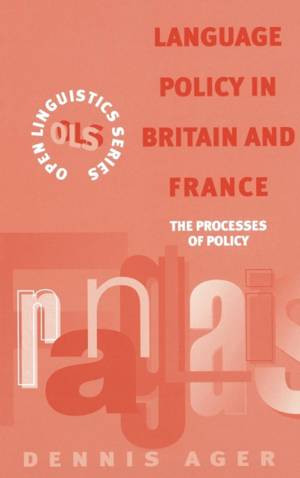
Bedankt voor het vertrouwen het afgelopen jaar! Om jou te bedanken bieden we GRATIS verzending (in België) aan op alles gedurende de hele maand januari.
- Afhalen na 1 uur in een winkel met voorraad
- In januari gratis thuislevering in België
- Ruim aanbod met 7 miljoen producten
Bedankt voor het vertrouwen het afgelopen jaar! Om jou te bedanken bieden we GRATIS verzending (in België) aan op alles gedurende de hele maand januari.
- Afhalen na 1 uur in een winkel met voorraad
- In januari gratis thuislevering in België
- Ruim aanbod met 7 miljoen producten
Zoeken
Omschrijving
This book examines the making of language policy, and to a certain extent language policy itself, in Britain and France. It defines what language policy is and to what is applies, and how disciplines such as sociolinguistics and the analysis of the politcal process help in studying the language policy and policy-making. An examination of language policy on both countries up to 1995 pinpoints the main characteristics, and study of both the cultural and the political environment in which policy-makers work is seen as crucial to understanding. The policy-making process itself it studied in a number of stages: what causes policy-makers to show interest in language questions? How are language problems identified as such? Is there a language policy network or community and, if so, which groups and individuals influence it? How are negotiations over policies conducted? Once policy has been decided, how is it implemented, and how different are the methods used? What is the outcome of the policies? Six main case studies illuminate the discussion and provoke the comparisons: support for English or French abroad, spelling reform in France, the Toubon law of 1994 and the Welsh Language Act of 1993, language policy for immigrants, sexism in language and government responses to literacy. finally, the author asseses and compares the policies, and the effectiveness of policy-making, in the two countries. Dennis Ager is Proffesor of Modern Languages at Aston University, Birmingham.
Specificaties
Betrokkenen
- Auteur(s):
- Uitgeverij:
Inhoud
- Aantal bladzijden:
- 224
- Taal:
- Engels
- Reeks:
Eigenschappen
- Productcode (EAN):
- 9780304337590
- Verschijningsdatum:
- 30/04/1998
- Uitvoering:
- Hardcover
- Formaat:
- Genaaid
- Afmetingen:
- 151 mm x 239 mm
- Gewicht:
- 530 g

Alleen bij Standaard Boekhandel
+ 780 punten op je klantenkaart van Standaard Boekhandel
Beoordelingen
We publiceren alleen reviews die voldoen aan de voorwaarden voor reviews. Bekijk onze voorwaarden voor reviews.









